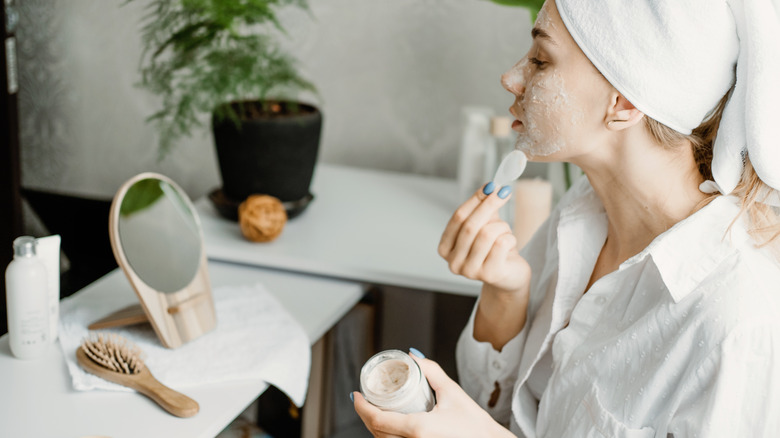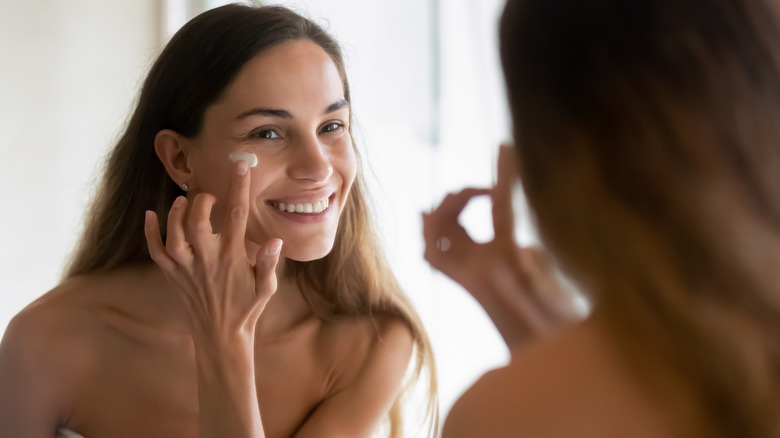Here's How Often You Should Switch Up Your Skincare Routine
We may receive a commission on purchases made from links.
The skincare world can be an overwhelming one to embrace because, beyond the basics of a cleanser and moisturizer, there are various products you can integrate into your routine. Often, there are certain ingredients like retinol that should only be used in a nighttime skincare routine, and sunblock that is touted as a must-have in your morning skincare regimen.
Major skincare enthusiasts, like YouTuber Hyram, have gained millions of followers by teaching everyday people about the nuances of skin care. While this has sparked a passion amongst many consumers, it also brings a heightened awareness to the ingredient labels and brands out there. Do they use fragrance? Where are they sourcing their ingredients? Is natural skincare always better? It can seem like the more you know the more questions you start to have.
Of course, starting out with a skincare routine usually begins by understanding your natural skin type and then trying to find products that can meet your specific needs. While you may be tempted to switch up your skincare routine every time a new product starts trending on social media, this can actually irritate your skin over time.
Skincare is a labor of love
It's understandable that those who are passionately invested in skincare would be ready to jump on the newest product launches, especially if they are getting amazing reviews. Unfortunately, less is often more with skincare and patience is a virtue when it comes to new products. Every single ingredient you use on your face has the ability to help or hurt your skin. Therefore, new ones need to be integrated slowly and carefully, in somewhat of a trial period.
Dermatologist Adriana Lombardi explained to Skincare that some results may appear instantly on your skin after using a new product, but you should ideally give them a month or two of consistent use before ultimately deciding their fate. Ingredients like retinol have been known to cause red, dry, and flaky skin. However, over time, it does wonders to diminish fine lines and wrinkles. This is why slowly working with one new product at a time can be easier on your skin and allow you to weigh the pros and cons.
Lombardi also discusses how your skin type can change with the weather. It may become dryer in the winter or more oily in the summer. Since the climate can actually dictate which products you are reaching for, she advises changing up your skincare routine with the seasons. This is also why learning how to choose your skincare routine based on where you live is helpful.
Learn what your skin needs
While finding ingredients that you love is an amazing feeling, they may not always remain a staple. Products like cleansers and moisturizers are typically the most important to establish because they lay the foundation of every skincare routine. However, they can be lighter or heavier depending on your skin type. If you have dry or sensitive skin, you will likely need a very light cleanser with a thicker moisturizer. On the other hand, those with oily or acne-prone skin may need a stronger or deeper cleanser with a much lighter moisturizer.
So much of skincare comes down to knowing yourself and recognizing the needs of your changing skin. While establishing a solid morning and nighttime skincare routine is a good step, checking in with yourself as the seasons change will help you analyze if each product is still benefiting your skin. If you start noticing major skin changes like acne, irritation, or redness, it's a good indicator that you should switch things up.
It's also okay to outgrow your skincare routine. According to The Wellnest, your skincare routine should make you happy and excited. Trying new products and watching how they work their magic on your skin can bring you joy and fulfillment. So, if you aren't loving a product or are dying to try a new one, it's okay to make a change. There's a reason why intuitive skincare is the key to your best complexion ever. Ultimately, skin care is about self-care, so it should be something you can enjoy.


